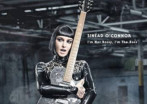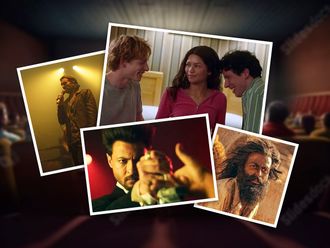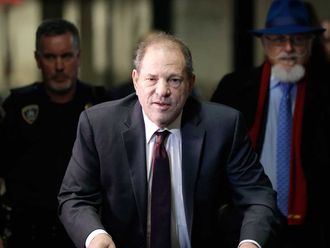
Over the course of a career getting on for three decades, Sinead O’Connor, 47, has been called many things: a maverick, an attention-seeker, a crazy person even a terrorist (her words, admittedly). Today, though, as she begins an interview to promote her tenth album, I’m Not Bossy, I’m the Boss, there’s one thing she’s adamant she doesn’t want to be labelled as. “I don’t think of myself as being a feminist,” she says, when I ask if the movement’s latest wave has helped change the pop industry. “So I don’t really think about feminism a whole lot to be honest.”
Is she serious? “I wouldn’t label myself anything, certainly not something with an ‘ism’ or an ‘ist’ at the end of it. I’m not interested in anything that is in any way excluding of men.”
Of course, feminism doesn’t exclude men and, as I remind her, there are plenty of people who would say she was most definitely a feminist. “Well, equally, I’m not interested in anything anyone else might like me to be.”
That, right there, could be O’Connor’s motto. She’s an artist almost completely unlike anyone else, so it’s hardly surprising that interviewing her is almost completely unlike interviewing anyone else. She sits side by side with me in the hotel bar where we meet because, she says, she speaks so quietly that “journalists often tell me afterwards their tape recorder has nothing on it”.
She’s not wrong: I have to lean in on several occasions to catch whispered profanities or hushed denunciations of the Catholic church, of which she’s been a critic from pretty much the start of her career, famously tearing up a picture of the pope on Saturday Night Live in 1992. Commentators have long talked about the fascinating mix of vulnerability and aggression in O’Connor’s work, and in person she’s the same: shaven head, tattoos, black suit softened by those watery eyes that, thanks to the video for her breakthrough hit, 1990’s Nothing Compares 2 U, you feel you’ve been staring into for years. She appears nervous shaky hands fidgeting with the froth on her cappuccino and admits after the interview that she was. Yet she can make me feel equally nervous about choosing the wrong question.
“You know what, I can’t even remember any of this s***,” she’ll say, when I ask if she struggled dealing with her early success. “It’s all there online, you can Google it, it’s not s*** I really want to spend time talking about, s*** that went on 25 years ago. It’s not really an original question, is it?”
If these startling contrasts and contradictions are what have made O’Connor one of the most remarkable artists of recent times, then maybe her statement on feminism makes a little more sense. She may not like being labelled as one, but that doesn’t stop her spending the next hour or so repeatedly railing at the injustice of inequality between men and women: from the ordination of female priests to the way women are treated in the media to the observation that “when you tell people that you write your own songs their jaws hit the floor”.
Such views are scattered throughout her new album, too. The startling picture on the album’s sleeve — O’Connor embracing a guitar in a latex dress and black wig — was intended to show that you can “still be sexy with lots of clothes on”. Meanwhile, the opening song How About I Be Me revisits the reaction to a humorous article she wrote for the Irish Independent in 2011, advertising for a man.
The very frankness that made it funny also led to accusations that she was suffering from mental illness (something that O’Connor has in fact suffered from, and talked openly about, in the past). “It’s very interesting that people would assume that just because a woman is being open about sex it’s a symptom of her being unwell,” she says.
I’m Not Bossy, I’m the Boss is an album influenced by Chicago blues — O’Connor cites Buddy Guy and Howlin’ Wolf as influences and has what she calls a “dirty edge”. She says it’s “just an album of love songs” but there’s depth to them, with many written from the perspective of characters whose stories develop as the album progresses.
Mileygate
Last year, O’Connor caused a stir when she wrote an open letter to Miley Cyrus warning her that the music industry would try to prostitute her. It was a response to the former child star’s Wrecking Ball video — directed by Terry Richardson, who has been accused of predatory behaviour towards models — in which Cyrus, among other things, appears naked and licks a sledgehammer.
“You can’t take the sex out of rock’n’roll that’s really important,” she says. “What bothers me is that the artists that are most sexualised look like children and their audiences are children. I don’t think it’s appropriate to start sexualising an artist like Justin Bieber at 15-16 years of age — he’s too young to know the decision he’s making. They were selling [expletive] pole-dancing kits at Tesco [in 2006 Tesco was criticised for selling the Peekaboo pole-dancing kit, a product it said was aimed at over-16s, but which was later removed from its website], you can get G-strings for kids …It’s very dangerous, it’s why we have trafficking.”
She firmly refuses to discuss Mileygate, but she hasn’t stopped keeping watch on other young female stars who she deems to be having a difficult time. She reveals that she recently tried to get in touch with Lana Del Rey, although she has yet to hear back. Is it a maternal instinct — she has four children, with four different fathers, the youngest seven and the oldest 27, and in her letter to Miley she wrote that her intentions were out of “motherliness” — that causes her to look out for younger stars?
She’s not sure. “I guess I give a s*** about people is all. And I don’t know if I’m even old enough to be Britney Spears’s mother, I hope I’m not [Spears is 32]. It’s more that when you’ve been through grievous things yourself, and you see it happening to other people, you just want to snuggle them. It’s the same if I saw a stranger crying in the street, I would want to go over and snuggle them because I know what it’s like to cry on the street. I think that’s the same for most people we have empathy because we’ve been through s*** ourselves.”
So is it more a feeling of being wise, that you have something to teach about the music industry? She looks shocked. “I wouldn’t have anything to teach anyone other than ‘never get involved in it’. My advice is to run away and get a real job.”
There’s a song on the new album called 8 Good Reasons, on which O’Connor snarls: “You know I love to make music/ But my head got wrecked by the business.” The industry side is something she says she’s still allergic too and she doesn’t think much has changed since she started.
“It sounds corny but the establishment doesn’t have a vested interest in any of us waking up out of what Bob Marley called mental slavery and actually trying to make the world a better place. Nor does it have an interest in the young people of this world trying to make it a better place. Young people’s heroes are musicians, so if you want to keep the establishment going you have to make sure that young people are controlled. One way to do that is to put people on the radio who aren’t saying anything, not doing anything that might rattle the system.”
Could an artist like you come out now?
“If I just shut up and sang, and I was a good little girl, then maybe,” she says. I think we all know the likelihood of that.











